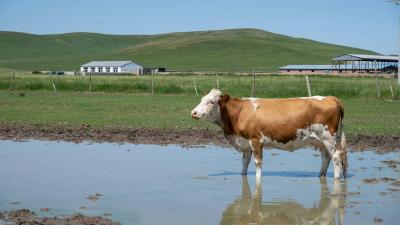Eat Your Way to a Good Night’s Sleep

According to a new study, 1 in 3 Americans are chronically sleep deprived. And we’re paying for it—not just by dozing off and yawning throughout the day, but through our overall health.
According to a new study, 1 in 3 Americans are chronically sleep deprived. And we’re paying for it—not just by dozing off and yawning throughout the day, but through our overall health.
When we sleep, our brains act like a road crew that comes out at night to fill in potholes and repave roads before the morning rush hour. Our bodies need sleep to rest and recharge. Without a sufficient amount of sleep—seven to eight hours for most people—we increase our risk for developing serious health problems. Sleep deprivation has been tied to obesity, elevated blood pressure, and Alzheimer’s disease.
Cutting caffeine, reducing alcohol intake, staying active during the day, and maintaining a consistent schedule can all set the tone for a good night’s sleep. But evidence suggests that diet may play a role, too.
One recent study found that diets rich in fiber and low in saturated fat can lead to deeper, more restorative sleep. It’s not uncommon for people who have improved their diets to report that they feel energized during the day and sleep better at night. Last year, when Jere Downs traded in greasy burgers and fries for green smoothies and chickpea sandwiches on a 22-day vegan challenge, she reported that her “sleep is deep and uninterrupted. My eyes pop open at 6 a.m.”
So what makes plant-based foods so beneficial for sleep? Complex carbohydrates stimulate the release of serotonin—a neurotransmitter that calms your brain and helps you sleep. So building your dinner around starchy foods, like pasta, rice, and potatoes, will help you doze off and stay asleep through the night.
While many people believe that high-protein meals are key to getting a good night’s rest, the opposite is true. High-protein foods block the brain’s ability to produce serotonin. Because high-protein foods contain more amino acids, tryptophan—the amino acid that eventually turns into serotonin—is crowded out of the brain. As a result, high-protein foods will leave you feeling alert.
High-protein plant-based foods, like tofu, beans, and lentils, are very nutritious. But if you’re having trouble sleeping, try eating these foods earlier in the day. You’ll feel more alert during the day, while favoring carbohydrates later on can help you rest at night.
For more on diet and sleep, watch my appearance on The Ellen Show:
Food to Help You Sleep
Dr. Neal Barnard was in the house to give some helpful tips on foods that will help you sleep through the night, and other useful tips!








